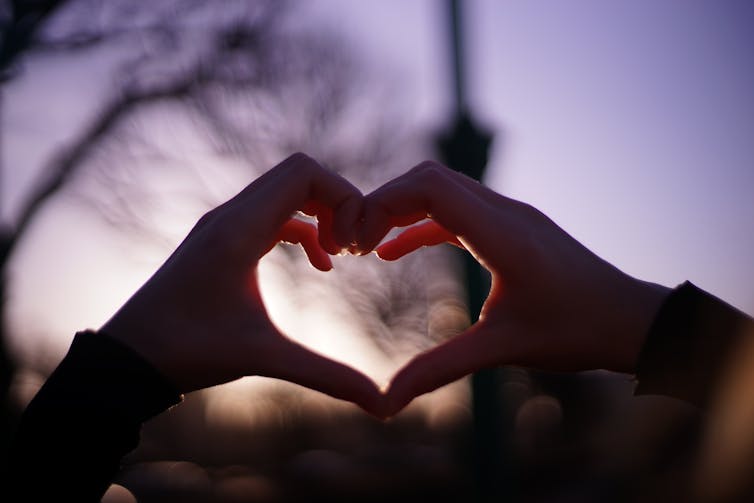
We’ve seen it in our favourite romantic comedy – and for many of us, we’ve even felt it in real life. The door of the café swings open, in walks the person of your dreams. Momentarily, you’re paralysed. Temporarily overwhelmed. And then you feel it, in your chest.
Is it love at first sight? Is your heart really beating faster than normal? Does it feel – even just for a second – like it’s skipped a beat?
It turns out the movie scenes, songs and poems are right to some extent. Feelings of love and attraction do affect the heart.
Read more: When sex is at steak: Beefing up men's desire for meat
A heartful of feelings … also blood affected by hormones
It’s actually quite normal for your heart to beat faster (or race) – and can happen when you’re excited, nervous, angry or even if you’ve had too many coffees.
You’ve probably heard of the fight or flight response. Well, that also explains the feeling of your heart racing during a romantic moment.
Your brain sends a signal to your adrenal glands, two little hormone-producing organs that sit on top of your kidneys. This produces a small boost of the hormone adrenaline. It moves via your bloodstream directly to your heart, where its action is to temporarily make your heart beat faster.
The body appears to react this way, even though you’re not necessarily in danger. If you were running away from a bear, the increased heart rate would prepare your muscles to run. When love or attraction strikes, this might be your body’s way of preparing you to run into the arms of your perfect match.
Phew! So, it’s not life threatening?
Probably not. Particularly if you don’t notice it happening frequently and are otherwise in good health.
In response to a surge of adrenaline, your heart racing is almost certainly due to sinus tachycardia. This is when your heart is still beating in a normal rhythm, but faster – like what happens during a good gym session or a run around the block.

There are other conditions that can cause someone to feel their heart is racing. Supraventricular tachycardia (SVT) is a condition that results from someone having an extra electrical circuit in the heart. We’re all born with natural electrical circuits, but some people have an extra circuit. In certain situations, that circuit activates and causes palpitations. While the symptoms of SVT can be disconcerting, it’s usually benign and can be easily treated with a small surgical procedure.
Another condition is atrial fibrillation (AF), which results in an irregular and sometimes very rapid heart rhythm. AF is the most common arrhythmia seen in clinical practice by cardiologists, and its prevalence increases with age.
Approximately 5-10% of Australians will develop AF in their lifetimes. AF can vary in severity, from occasional episodes of electrical disturbance, to a more serious condition that can result in impairment of how the heart pumps, leading to poorer quality of life and a risk of stroke or heart failure. Some AF is effectively managed with medication, while other people may require cardioversion (delivering a small shock to the heart) or ablation (a procedure which deactivates cells in the heart that cause AF).

Read more: How to write a love poem
That explains the electricity. But can it actually skip a beat?
Yes. It’s absolutely possible for the heart to skip a beat. That can be triggered by the same things that make your heart race – stress, anxiety, dehydration and a range of other things. These premature beats are almost always benign, meaning they aren’t life-threatening or the sign of a heart attack in the making.
So, whether it’s love, or the excited thrill in anticipation of love, your heart really does behave differently when romance walks in the door. The best thing we can do for our hearts is maintain a healthy lifestyle. That means exercising regularly, quitting smoking, and checking in with your doctor for a heart health screen to make sure it’s just love, and nothing more sinister.


This article originally appeared on The Conversation.





